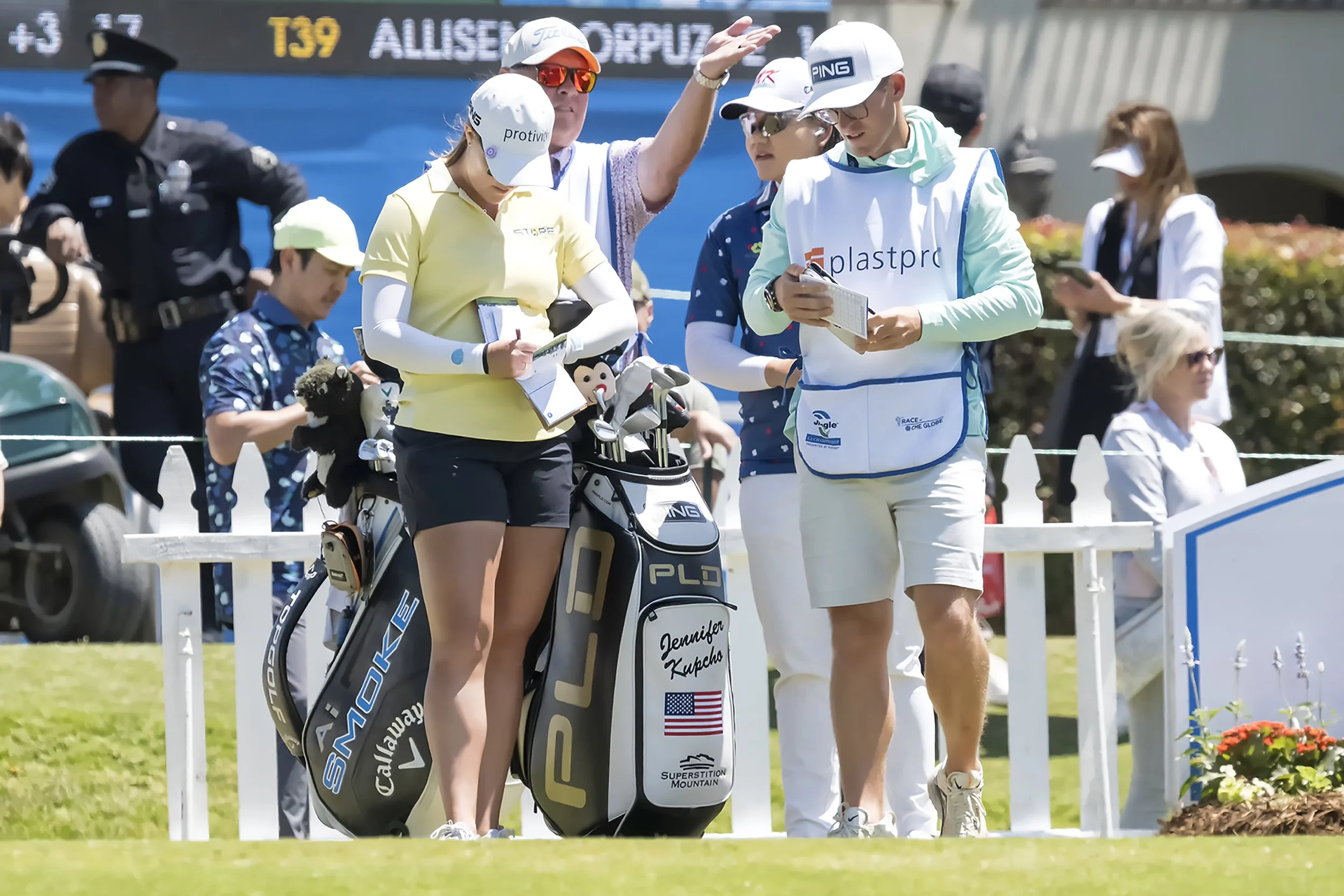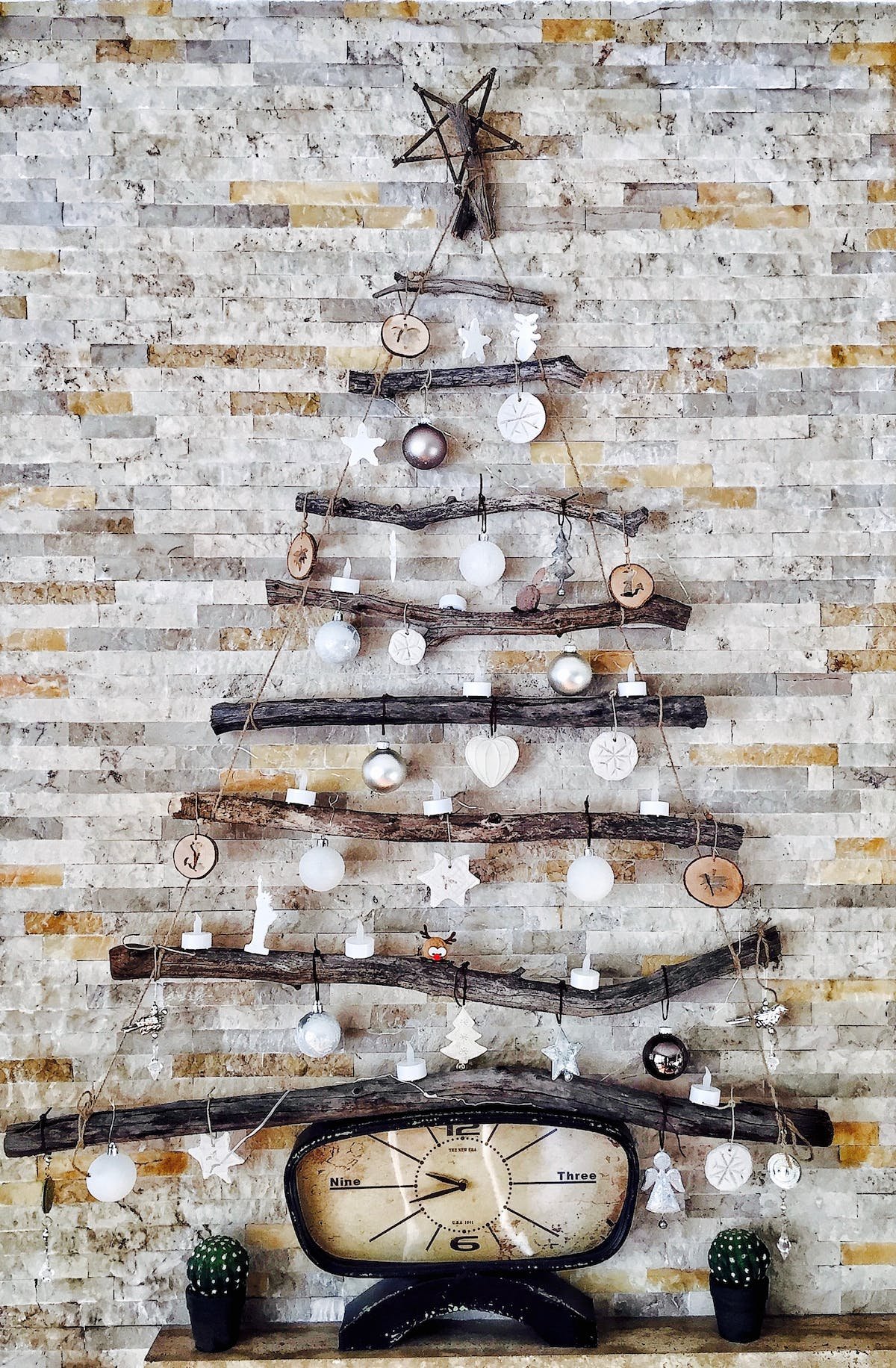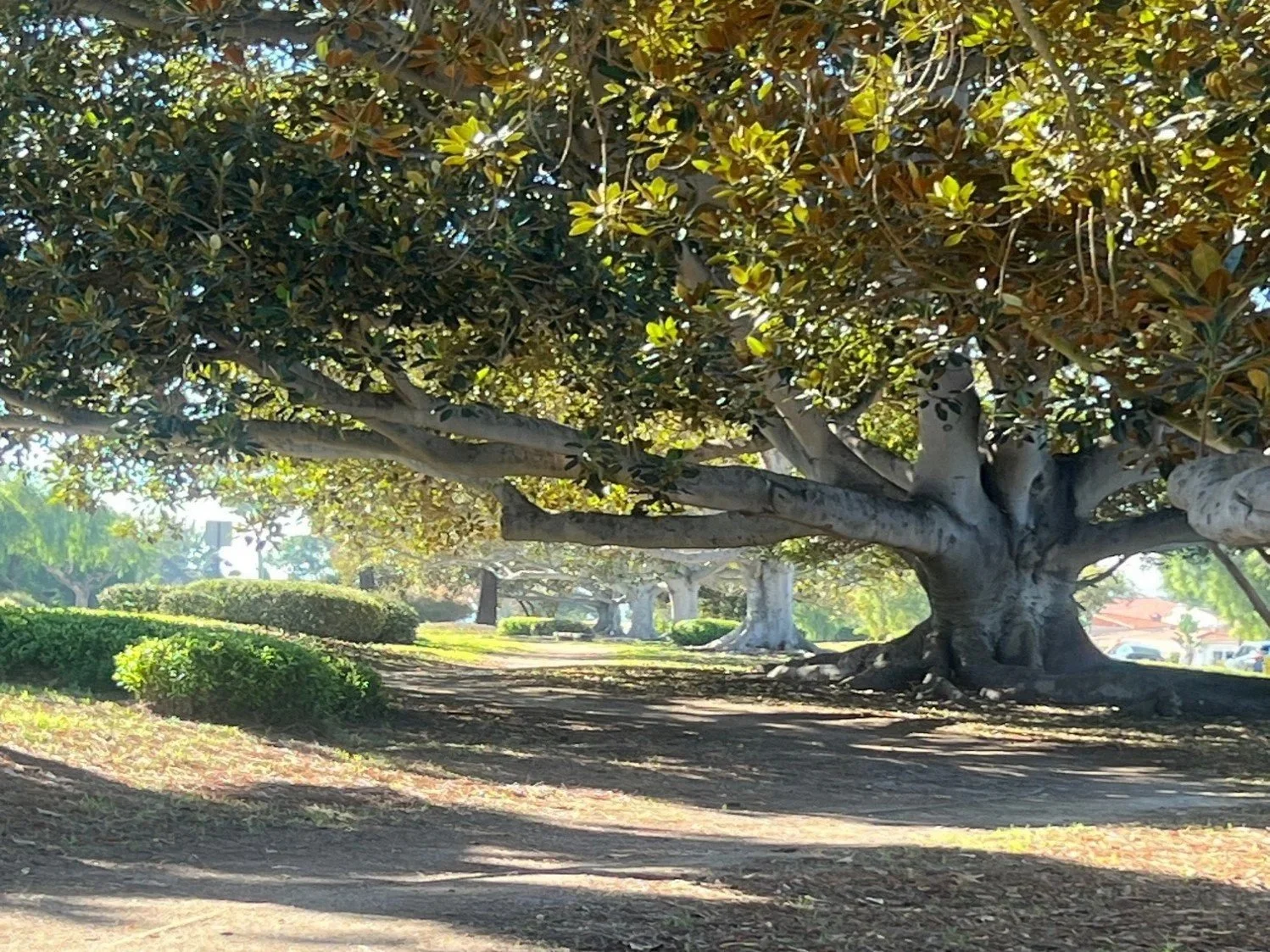When it Comes Winning on the Tour- It is a Matter of Trust and Teamwork Photographer & Contributor Steve Tabor
Whether you’re watching a golf tournament on television or in person, it seems that being a professional golfer can seem very isolating and stressful. Having to make a putt to salvage a round or even move you into the big money can be a test of anyone’s nerves.
The drama and stresses might be unbearable week after week, if it weren’t for the professional golfer’s best friend, their caddie. Having a caddie can make all of the difference to a golfer. They can restore your confidence in your abilities, reduce your anxiety, and even bring a smile in the most desperate of times.
The relationship between a golfer and caddie is similar to a marriage. In order to be a successful partnership, there is a high degree of trust and honesty. And yes, there is that X-factor that makes it all work.
Oscar Mourier, caddie for Danish LPGA Golfer, Nanna Madsen, simply sums up the relationship between the player and caddie, “We’re a team. We are accountable to each other.”
Nanna Madsen and caddie, Oscar Mourier, work on Madsen’s putting alignment using a laser mounted to the putter shaft.
Although most of the time, professional golfers make the game look easy, Gary Marshall, a long time professional caddie now working for LPGA Professional, Karis Davidson, states, "Make no mistake, these golfers are talented athletes. They hit the ball farther than most amateur male players and their shot making skills are second to none. They work hard and dedicate themselves to improving their game throughout the year whether they are playing in a match or they are taking a break from tournament play. They spend hours in the gym training, working on their strength, flexibility, and overall fitness. Then they head out to the practice range and course with a specific plan of action. They work on every aspect of their game; long game, short game, putting and perfecting their shot making skills.” Marshall and other caddies acknowledge that with that much dedication, the players expect the same work ethic from their caddies.
With his years of experience, veteran professional caddie, Gary Marshall, is an excellent partner for LPGA golfer, Karis Davidson, who joined the tour in 2022.
As for each caddie, Jay Davey, caddie for LPGA golfer, Chanettee Wannasaen, states preparation is the key to a player’s and caddie’s success. The player expects their caddie to know the ins and outs of each course week in and week out. It is not just knowing the distances, but knowing all the characteristics of the course. For example, the grass is usually mowed each morning before play begins, which means as day goes on, the grass on the fairways, rough, and greens will grow throughout the day. It may seem like a subtle issue, but it can influence fairway roll, hitting balls out of the rough or the speed and break of a putt. Some areas on the courses are more protected by the natural features than others, other areas are more exposed, so caddies have to remind themselves and their player of these differences. Caddies are constantly paying attention to the weather conditions as they move about the course. To television viewers, bunkers always seem to be in excellent condition, however bunker surfaces can be vastly different from course to course, and they will affect your swing and how the ball reacts coming out of the bunker. Knowing the speed and break of the greens can vary from day to day and within the round. During the day, greens can dry out and become firmer, moisture can make the greens softer and reduce the amount of roll on an approach shot. The players depend on their caddies to give them all the information they can in order to keep to their strategy and execute each shot throughout their round.
Another veteran caddie, Jay Davey (bucket hat), is on the bag of LPGA veteran Chanette Wannasaen.
In order to keep this information in an organized and accessible manner, players and caddies use their Green Book. Usually, slid into a back pocket or in a caddie bib pocket. These small notebooks contain annotated illustrations of each hole and green showing slope and markings showing how a ball would roll from particular locations on the green. Caddies update their Green Book continually, during their morning walks, practice rounds and playing rounds. Players also update their Green Book during their rounds. Whether they are in the fairway, near the green, or on the green, you will see players and caddies carefully reviewing their Green Books throughout their round.
Jin Hee Im and her caddie, Kylie Pratt, compare notes in their Green Books to review the appropriate distance to the pin.
In today’s competitive atmosphere and the greater access to increasingly better equipment, players want caddies to provide them with increasing amounts of information during their round. Jason Hamilton, veteran caddie for LPGA standout, Patty Tavatanakit, stresses that the importance of doing your preround preparations and having confidence in your prep work and numbers is more important than ever.
Hamilton states every caddie and player is quick to acknowledge the improvement of club and ball technology has improved distance and accuracy. But, they acknowledge the use of rangefinders have sped up play and given more confidence in club selection. Although any professional caddie stands by the distances in his/her Green Book, they admit that rangefinders have really assisted with the accuracy of determining the distances from certain angles. Trusting the distance creates an unmatched degree of confidence in a player.
Patty Tavatanakit and Jason Hamilton spend a few quiet moments preparing for their round prior to teeing off at the first hole.
Hamilton points out that the player is constantly thinking. As soon as they complete their shot, they begin thinking about their club selection and how they will play their next shot. Every caddie is expected to know their player’s thoughts and not only anticipate what club they will need, but have answers ready to any question they should have.
Davey and Hamilton agree that when a player has a question for their caddie, they are looking for a confident and committed response. Don’t’ be hesitant when it comes to providing answers or suggestions. Occasionally, it is acceptable to say, “I don’t know,” but that should not become a frequent response. Players and caddies have to expect honesty, and if a critical remark should be made, have the ability to let it go and refocus on the task at hand. Also, caddies should know their player’s game well enough to confidentially make recommendations not only about club selection, but the type of shot to play, and aim points. Most importantly caddies and players have to fully commit to shot and where they want the ball to come to rest. It is easy to get out of position on the course and on the green. Most likely the player will know what shot they need to play to get back in position, but it is up to the caddie to assist the player with playing to their strengths and avoid having the player make another mistake that takes them farther out of position.
Winner of the 2024 ShopRite Classic presented by Acer, Swedish LPGA professional, Linnea Strom and her caddie, George Twyman, review course conditions and pin placement to determine Strom’s club selection.
There is probably no other player/caddie team who know each other and what it takes to bring out the best in a player than the wife and husband of team of LPGA player, Lauren Coughlin, and her caddie, John Coughlin. Early in her tour days, John remained at home and worked in the development office fundraising at the couple’s alma mater, University of Virginia. As Lauren extended her time on the tour, she found that she was not at home frequently enough and thought it would be better to have John come on the road with her. John served as a traveling secretary, but kept dropping subtle and not so subtle hints about how he could caddie for her.
Lauren and John Coughlin have known each other since their freshman year at the University of Virginia. John says that knowing Lauren for that amount of time has given him the opportunity to develop deeper insight into her game and personality that allows him to draw out the best in her.
Although she enjoyed having John along she found that life on the tour was becoming a grind. Although she did not want to leave the game, she knew she need to make a change. Lauren admits that it was her last stop on the Asian portion of the tour that she decided to part ways with her current caddie and decided to give John a try on the bag. Both admit that the dynamic has changed Lauren’s approach to her game.
Coughlin attacks the pin from a greenside bunker.
John states, “Knowing her for so long, I know her at a level others don’t, and this allows me to assist her in ways that no one else could do. I know how she handles pressure when things don’t go as well as she thinks they should and ways that we can overcome those frustrations. We developed a strategy where we treat every round like it was the first round of the week. We don’t get ahead of ourselves, and stay in the moment. We focus on trusting the process and don’t get distracted with details between shots. We casually talk between shots, but within about 10 yards of the ball, we refocus on the shot at hand and commit to that shot.”
Confident that her caddie, Ryan Hilton, has given her the appropriate target line and distance, Alexandra Forsterling, is ready to tee off as Linnea Strom and her caddie, George Twyman, look on.
“Communication on the course is important. We do not dwell on a bad shot and avoid second guessing. You would think as a married couple, it would be difficult to separate life on the course and life off the course, but they both admit that once they leave the course, there is no talk about the round or tomorrow’s round. It is time for us to be ourselves.” Lauren admits with John on the bag, “She feels more relaxed on the course and the change has made a positive impact on her game and outlook.” John shares “I have also seen a positive change in how she approaches her game and her attitude about being on tour.”
Communication and trust are key elements to the player/caddie relationship. LPGA Rookie, Auston Kim relies on LPGA veteran caddie, Sarah Bowman, for her guidance and course knowledge.
For Ben Lown and his professional golfer, Stephanie Meadow, have been together for approximately 3 years. Lown and Meadow share that personality-wise they get along well which makes it easy to work together. He says on the course they are chatty. Like most partnerships, they mix casual conversation between shots or while waiting in the tee box with focused dialogue when they approach the ball and determine how to play the next shot.
Between shots Stephanie Meadow and her caddie, Ben Lown, engage in casual conservation, but it becomes all business, as they approach the ball.
Lown shares that Meadow trusts him when it comes to suggestions and discussions over strategy and shot selection. Honesty is key to their communications.
Meadow has been on the tour for over 10 years, she has learned to be accepting of mistakes and errors. Lown points out she knows how a professional golfer should work and knows how to handle a variety of situations.
Jennifer Kupcho (yellow) with caddie, Joshua Udelholfen, prepare for their round while Wichanee Meechai and her caddie, Christopher Chattin, review their strategy for the hole.
Lown and Meadow admit they stay in touch with one another when they are not on the course. Lown points out that not every player/caddie team follows this practice, but it works for them. Meadow keeps Lown apprised of what is she working on during their time away. Lown summarizes the benefits of this extension of their relationship as, “When we are back together, I know what to look for and what she trying to implement. As we walk the course I can look for these changes and give her feedback on her game.”
Just short of the green, Grace Kim and her caddie, Drew Ernst, review the break of the green and the appropriate landing spot for her pitch shot.
As for Gary Marshall and his LPGA professional, Karis Davidson, he shares that he has known her since she was 19 years old. Both Marshall and she were born in Scotland, which he attributes to their similar sense of humor and personality traits. The 25 year old has been playing since age 4, but recently found herself on the LPGA tour. In his role, Marshall finds himself discussing course management and confirming shot strategy and club selection. He observes, “Despite my extensive experience as a professional caddie, I am constantly learning from every player I work with, and I incorporate this into how I work with each player.”
Rose Zhang (red) and her caddie, Ollie Brent, share a conversation with Haeran Ryu (white) and her caddie, Martin Bozek, before teeing up on the first hole.
Whether you talk to a seasoned veteran or a first year player, they all agree that they view their success is tied to their preparation along with the trust and relationship they have with their caddie. None of the golfers or caddies can clearly articulate what makes their relationship work, and find it hard to limit it to just one factor. But, they all admit there is ‘just something about their relationship that works.’ And when it really works, Ben Lown sums it up best, “There is nothing better than winning!”
For Stephanie Meadow and caddie, Ben Lown, a win is always something to smile about.
Steve Tabor
This South Bay native’s photographic journey began after receiving his first 35 mm film camera upon earning his Bachelor of Arts degree. As a classroom teacher he used photography to share the world and his experiences with his students. Steve began his photography career photographing coastal landscapes and marine life. His experiences have led him to include portraits and group photography, special event photography as well as live performance and athletics in his portfolio. As a contributor and photojournalist, he has published stories about the people, places and events in and around the Palos Verdes Peninsula and beyond.
Interested in seeing more of Steve’s work, visit website at: www.stevetaborimages.com






















